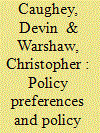| Srl | Item |
| 1 |
ID:
174447


|
|
|
|
|
| Summary/Abstract |
Retrospective voting is a crucial component of democratic accountability. A large literature on retrospective voting in the United States finds that the president’s party is rewarded in presidential elections for strong economic performance and punished for weak performance. By contrast, there is no clear consensus about whether politicians are held accountable for the local economy at other levels of government, nor how voters react to the economy in a complex system of multilevel responsibility. In this study, we use administrative data on county-level economic conditions from 1969 to 2018 and election results across multiple levels of government to examine the effect of the local economy on elections for local, state, and federal offices in the United States. We find that the president’s party is held accountable for economic performance across nearly all levels of government. We also find that incumbents are held accountable for the economy in U.S. House and gubernatorial elections. Our findings have broad implications for literatures on representation, accountability, and elections.
|
|
|
|
|
|
|
|
|
|
|
|
|
|
|
|
| 2 |
ID:
159498


|
|
|
|
|
| Summary/Abstract |
Using eight decades of data, we examine the magnitude, mechanisms, and moderators of dynamic responsiveness in the American states. We show that on both economic and (especially) social issues, the liberalism of state publics predicts future change in state policy liberalism. Dynamic responsiveness is gradual, however; large policy shifts are the result of the cumulation of incremental responsiveness over many years. Partisan control of government appears to mediate only a fraction of responsiveness, suggesting that, contrary to conventional wisdom, responsiveness occurs in large part through the adaptation of incumbent officials. Dynamic responsiveness has increased over time but does not seem to be influenced by institutions such as direct democracy or campaign finance regulations. We conclude that our findings, though in some respects normatively ambiguous, on the whole paint a reassuring portrait of statehouse democracy.
|
|
|
|
|
|
|
|
|
|
|
|
|
|
|
|